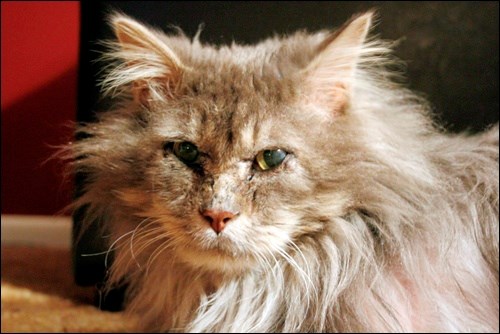A local veterinarian clinic has implemented a new policy to protect animals under the care of the Battlefords Humane Society, after an incident involving a family pet.
Karissa Aubichon, a North Battleford resident, adopted her cat Oscar many years ago in Saskatoon. Because of his skin allergies, Oscar was going to be put down in Saskatoon, because pets requiring special care are seldom adopted. Because of his cuddly personality, Oscar was spared and when Aubichon met him, he immediately occupied a place in her heart.
"He was just so sweet, he just wanted to snuggle and be close to you," said Aubichon.
The evening of April 24, Oscar escaped the house and got out into the family's yard.
"It's not normally a big deal," said Aubichon. "He stays right close to the front yard."
However, half an hour later, when Aubichon went out to call Oscar, he wasn't there.
"It was kind of strange," said Aubichon, explaining Oscar is a lazy cat and doesn't wander much.
Being the mother of a newborn, Aubichon was up most of the night, and regularly went outside to call for Oscar. The next day, Aubichon had a doctor's appointment for her baby.
"We were hoping Oscar would come back while we were gone," she said, but when Oscar still wasn't back, she and her husband called the Battlefords Humane Society.
They were told Oscar had been dropped off at the shelter by a person who had found him all the way across the river in Battleford.
Aubichon can't believe Oscar would have gone to Battleford on his own.
"We're pretty sure somebody picked him up and brought him there because he was lazy, really lazy," she said, not wanting to guess at the motives behind such an act. "He would've gone to anybody because he just loved attention."
Aubichon wasn't able to drive over and collect Oscar, however, because the Battlefords Humane Society had taken Oscar to Lakeland Veterinary Clinic.
"They said rather than put him in with the other animals, they brought him to the vet to be assessed," said Aubichon, saying she understands why the SPCA may have taken this precaution because of Oscar's appearance, especially since he had missed taking his medication the previous night, when he got out.
"He looks a little rough, but he's fine," said Aubichon, adding the Battlefords Humane Society promised to look into the matter and phone back.
"They didn't call back," said Aubichon, who, tired of waiting, called the vet herself and discovered the worst had happened.
"Oscar was put down at three in the afternoon, and at that point he had been gone not even a full day," she said tearfully.
Shawn Haas, a veterinarian at the Lakeland Clinic and president of the Battlefords Humane Society, said the decision to euthanize the animal - which he made after examining the cat - came down to a miscommunication.
He explained that animals brought to the shelter fall into two categories. One is when the owner gives up the animal - called a "surrender" - and the other is when the animal is either found by bylaw officers or members of public and brought in.
"Those animals we would describe as strays and we would normally hold them for 72 hours before they become the property of the humane society," said Haas.
Haas explained a Battlefords Humane Society staff member brought Oscar to the vet clinic, and although she did tell the receptionist the animal had just arrived at the shelter, "it was not communicated that it was a stray animal and not a surrender, so we here at the clinic were not aware that it was on a 72-hour hold."
Haas said upon examining Oscar, he found the cat had medical issues that could likely be managed, but not cured. He explained the shelter already has difficulty finding homes for all the cats that come in, and finding a home for an animal requiring special care is an unlikely possibility.
Haas added both he and staff at the shelter despise having to euthanize animals, but with limited space and funds, it is a reality of operating an animal shelter. To find out an animal who had a loving home had been put down in error, was tragic.
"It is a very unfortunate occurrence and I am very sorry for the owner of the cat that this happened," said Haas.
Although this is a unique situation, Haas said he doesn't want to see it ever happen again, and is taking measures to ensure it doesn't.
"I have talked to the shelter manager and we are looking at instituting a policy to prevent this from ever happening again," said Haas, adding the policy will likely involve labeling the kennels animals are transported in.
Ross MacAngus, supervisor of bylaw enforcement, echoed Haas's statements, saying, "Everybody in that system loves animals; the last thing they want to do is put down someone's pet."
MacAngus said the surest way to prevent a similar occurrence is to ensure pets are wearing their tags at all times.
"The City feels very bad that the animal was put down, but the onus is on responsible pet owners to make sure that their animal is licensed and kept on their own property," said MacAngus.
"We realize animals get loose," said MacAngus, adding licensing is affordable, with a fee of $20 per year for spayed/neutered animals and $60 per year for non-spayed/neutered animals.
"If the cat had its tags, when it got to the shelter, they would've gotten a call," he said.
Aubichon said although Oscar was licensed, he was unable to wear his tags.
"With his allergies he wasn't able to wear a collar because it would rub his fur off and his skin," she said.




